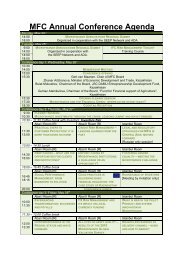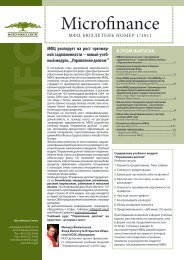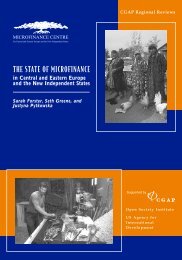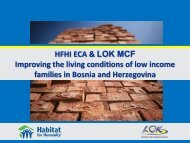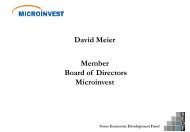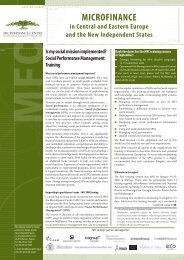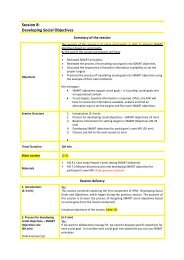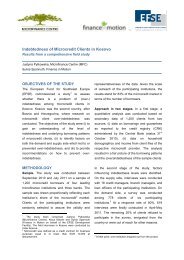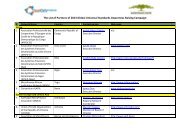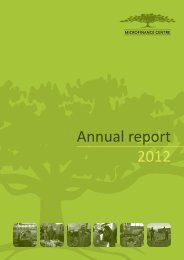Value Chains research report Tajikistan final - Microfinance Centre
Value Chains research report Tajikistan final - Microfinance Centre
Value Chains research report Tajikistan final - Microfinance Centre
Create successful ePaper yourself
Turn your PDF publications into a flip-book with our unique Google optimized e-Paper software.
highly contagious diseases in cattle which cause a public health concern-brucellosis,<br />
tuberculosis, leptospirosis, telerioz, rabies, and foot and mouth disease.<br />
Vaccines for preventable cattle diseases are supplied by both government and private<br />
enterprises. While some vaccines are available legally there is a considerable<br />
contraband market for vaccines coming through Kyrgyzstan. Although contraband<br />
vaccines and medicines are available on the black market for as much as 30% lower in<br />
price there is no quality control and many of the products are substandard and do not<br />
meet their intended purpose. In addition sellers of contraband medicines are not trained<br />
veterinarians and cannot provide accurate information on their use.<br />
In an interview with the entrepreneurs engaged in the sale of medicines and vaccines to<br />
veterinarians, the majority fear government regulation and operate in a shadow<br />
economy. They have a stable set of clients and are not interested in growing their<br />
business or meeting current regulations for the sale of vaccines and medicines. At<br />
present, there is no effort to move businesses out of the shadow economy to one that is<br />
regulated and providing quality vaccines and medicines nor is there any effort to<br />
produce vaccines in <strong>Tajikistan</strong> under controlled conditions.<br />
There are several reasons for the lack of interest in an improved vaccine and medicine<br />
situation in <strong>Tajikistan</strong> and lack of supply into Tajik market:<br />
• The high cost of registration,<br />
• Complicated license requirements,<br />
• The need for translation of instructions into local language,<br />
• The narrowness of the Tajik market,<br />
• A price increase by more than 18% due to VAT and customs duties,<br />
• Inspection by the large number of regulatory agencies.<br />
Housing. Cattle housing in <strong>Tajikistan</strong> commonly consists of a lean-to or rough structure<br />
with poor ventilation and damp conditions. F. Kuzibaev, Director of Zoovetkonsulting,<br />
estimates that over 70% of cattle housing does not meet basic standards of animal<br />
husbandry. Many farmers do not pay attention to housing and do not keep premises<br />
clean leading to disease and parasites. Stalls must be cleaned of manure frequently<br />
and clean bedding provided to provide a dry environment. Buildings must be well<br />
ventilated to remove ammonia build up which can lead to respitory diseases. Also it is<br />
important that the animals have accesses to the outside (sunlight) as cattle convert<br />
sunlight into vitamin D, a much needed vitamin for milk production. Cattle require<br />
additional care during pregnancy and birth requiring a well lit, clean, dry calving area<br />
and proper feeding. Many of these factors are not considered due to lack of knowledge<br />
and/or finances causing low beef production from unhealthy animals. Many farmers do<br />
not follow elementary rules of housing the animal.<br />
Economics of Meat Production. The ratio of return on investment in beef cattle<br />
production ranges from 20 to 40% depending on the labor, skill, care and feed. Most<br />
small farmers who purchase cattle at the market for fattening receive an adequate<br />
income and use cattle as a form of banking, selling animals when funds are needed.<br />
However, it is more attractive to investors to place money in a deposit account in a bank<br />
93



